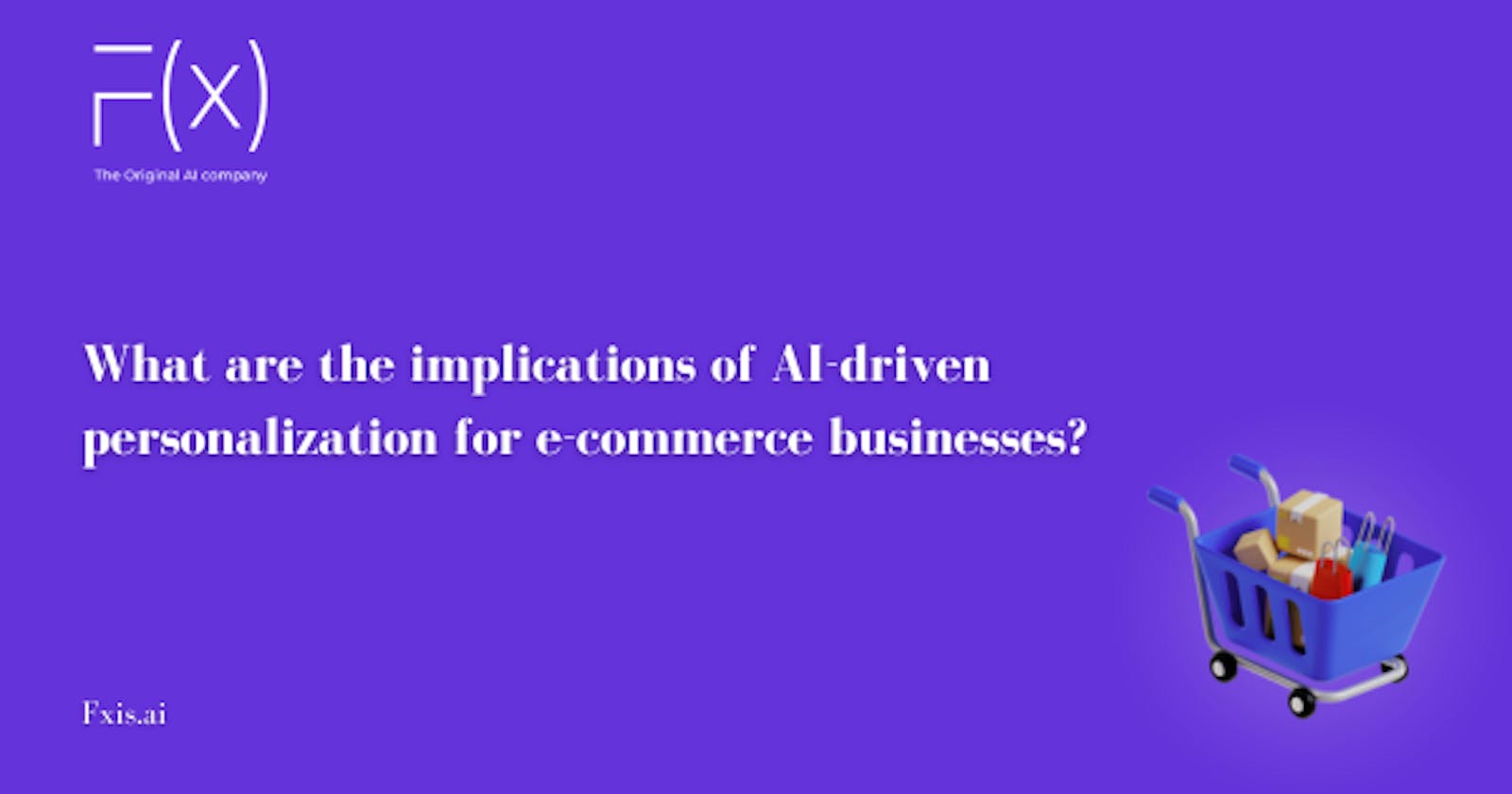What are the implications of AI-driven personalization for e-commerce businesses?
Unlocking the Power of AI in E-Commerce Personalization 🛍️✨
Introduction
In today's digital age, e-commerce businesses are constantly seeking ways to enhance the online shopping experience for their customers. One such way is through AI-driven personalization, which utilizes advanced algorithms to tailor the shopping experience to each individual user. In this article, we'll explore the implications of AI-driven personalization for e-commerce businesses and how it can revolutionize the way they engage with their customers.

Understanding AI-driven Personalization
AI-driven personalization involves the use of artificial intelligence algorithms to analyze user data and deliver personalized experiences to each customer. These algorithms can analyze vast amounts of data, including browsing history, purchase behavior, and demographic information, to create highly tailored recommendations and marketing messages for each user.
Benefits of AI-driven Personalization
The implementation of AI-driven personalization offers several benefits for e-commerce businesses. Firstly, it leads to an enhanced customer experience by providing shoppers with relevant product recommendations and offers based on their preferences and behavior. This, in turn, increases customer satisfaction and loyalty, leading to higher retention rates and repeat purchases. Additionally, AI-driven personalization can improve conversion rates by delivering targeted messaging and promotions to users at the right time.

Tailored Product Recommendations
One of the key features of AI-driven personalization is its ability to provide tailored product recommendations to users. By analyzing user behavior and preferences, AI algorithms can suggest products that are likely to be of interest to each individual shopper, increasing the likelihood of a purchase.
Dynamic Pricing Strategies
AI-driven personalization also enables e-commerce businesses to implement dynamic pricing strategies. By analyzing market conditions, competitor pricing, and customer behavior, AI algorithms can adjust prices in real-time to optimize revenue and maximize profitability. However, implementing dynamic pricing can also pose challenges, such as ensuring transparency and fairness for customers.
Personalized Marketing Campaigns
In addition to product recommendations, AI-driven personalization allows e-commerce businesses to create personalized marketing campaigns tailored to individual customers. This can include targeted email marketing campaigns, customized ad content, and personalized promotions based on user preferences and behavior.

Predictive Analytics and Inventory Management
AI-driven personalization can also benefit e-commerce businesses in the realm of predictive analytics and inventory management. By analyzing historical data and market trends, AI algorithms can forecast demand for specific products and optimize inventory levels to prevent stockouts and overstock situations.
Challenges of AI-driven Personalization
Despite its numerous benefits, AI-driven personalization also poses challenges for e-commerce businesses. One of the main concerns is data privacy, as the collection and analysis of user data raise ethical and regulatory considerations. Additionally, businesses must strike a balance between personalization and privacy to avoid alienating customers or violating privacy regulations.
Overcoming Implementation Challenges
To successfully implement AI-driven personalization, e-commerce businesses must invest in robust data infrastructure and analytics capabilities. This includes ensuring the accuracy and quality of data collected, as well as implementing measures to protect user privacy and security.
Case Studies and Examples
Several e-commerce businesses have successfully implemented AI-driven personalization to enhance the customer experience and drive sales. For example, Amazon utilizes AI algorithms to provide personalized product recommendations to its users, resulting in higher conversion rates and increased revenue. Similarly, Netflix leverages AI-driven personalization to recommend movies and TV shows to its subscribers, leading to greater user engagement and satisfaction.
Future Trends and Innovations
Looking ahead, the future of AI-driven personalization in e-commerce holds exciting possibilities. Advancements in AI technology, such as machine learning and natural language processing, will enable businesses to deliver even more personalized experiences to their customers. Additionally, personalization efforts are likely to extend beyond e-commerce to other industries, such as healthcare and finance, as businesses seek to better understand and cater to the needs of their customers.

Conclusion
In conclusion, AI-driven personalization holds immense potential for e-commerce businesses to revolutionize the way they engage with their customers. By leveraging advanced algorithms and predictive analytics, businesses can deliver highly tailored shopping experiences that enhance customer satisfaction, drive sales, and foster long-term loyalty.
However, businesses must also navigate the challenges associated with data privacy and implementation to ensure the success of their personalization efforts.
Ultimately, embracing AI-driven personalization is essential for e-commerce businesses to stay competitive in today's digital landscape.
For more insights into AI|ML and Data Science Development, please write to us at: contact@fxis.ai| FxisAi
#ECommerce #AI #Personalization #CustomerExperience

